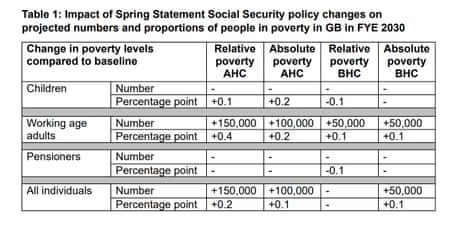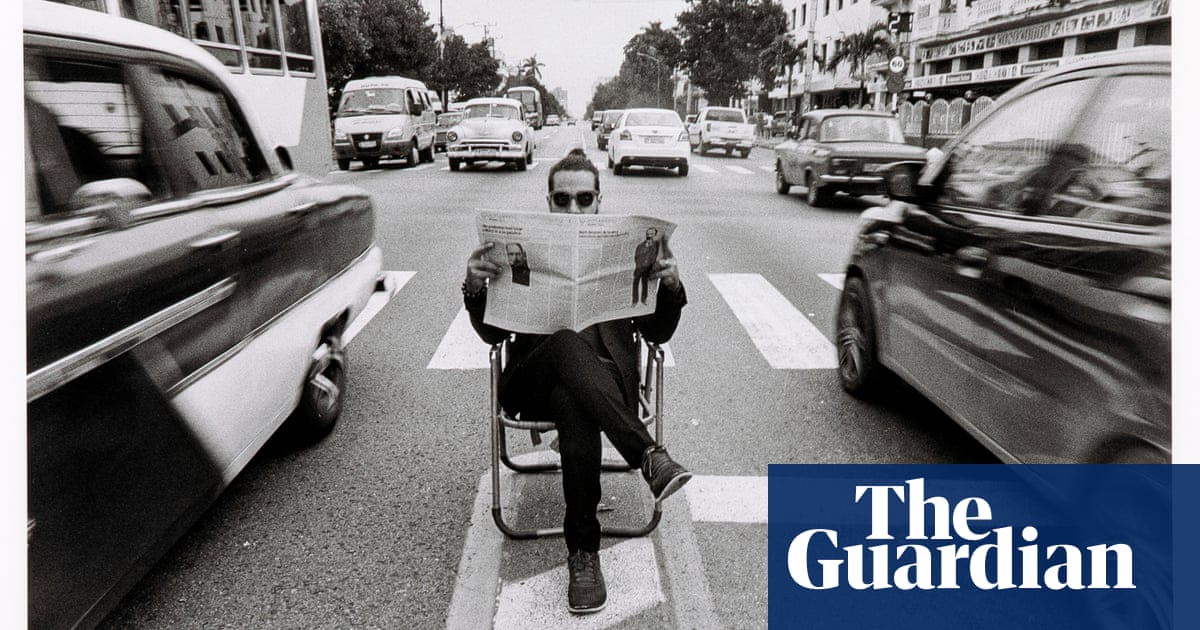DWP says 150,000 more people pushed into poverty by benefit cuts - not 250,000 as forecast said before U-turn
The Department for Work and Pensions has just published an analysis saying that, allowing for the concesssions announced last week, the welfare cuts will still push an extra 150,000 people into relative poverty.
Here is the key chart from the document.

In March, when the government published an impact assessment of its original plans, that said the plans would push an extra 250,000 people into relative poverty.
Key events Show key events only Please turn on JavaScript to use this feature
Lisa Nandy to make Commons statement on 'death to IDF' chanting at Glastonbury
There are three statements in the Commons after 3.30pm:
-
Liz Kendall, the work and pensions secretary, on the benefit cuts
-
Lisa Nandy, the culture secretary, on the “death to the IDF” chanting at Glastonbury
-
Michael Shanks, the energy minister, on Prax Lindsey oil refinery
We knew Kendall was making a statement, but it seemed more likely Glastonbury would come up in a UQ.
Here is Michael Savage’s latest story on the Glastonbury controversy.
DWP explains why its update does not say what impact bill will have on number of disabled people in poverty
Here are some more points the Department for Work and Pensions is making about its updated assessment of the impact its benefit cuts will have on poverty. (See 12.15pm and 12.31pm.)
-
The poverty assessment does not take account of behavioural responses, the DWP says. It explains:
The Department for Work and Pensions’ Policy Simulation Model (PSM) is used to model the impact of policies on individuals and poverty levels. The PSM is a static microsimulation model based on a snapshot of the UK population from the Family Resources Survey (FRS), currently for the financial years ending 2020, 2022 and 2023. It uses caseload forecasts alongside benefit rules to simulate results such as poverty levels for each year, currently up to and including FYE 2030. Because the PSM is a static model it does not capture the behavioural impacts of policies, such as changed work incentives due to reductions or increases in benefit rates, or a small number of additional benefit claims expected as a behavioural response to the reduction in household incomes due to the measures.
This means these figures don’t take account of the fact that, when benefit payments change, people react – and how they react will also have an impact on poverty figures.
But no one really knows what the behavioural impacts of these cuts will be. Ministers believe that the current system give people out of work an incentive to say they have a sickness or disability that stops them working (because those benefits are worth more than standard universal credit). The proposal will narrow this gap, by making the standard rate of UC more generous. Ministers hope this will incentivise people to find work.
But there is an argument that because it will make standard UC a tiny bit more generous, it may reduce the incentive for standard UC claimants to find a job. And with Pip being removed from some people who qualify now who don’t have a four-point need on some criteria, the new rules could incentivise more people to claim on the grounds of a more severe disability.
-
The DWP claims it has not been able to estimate the impact of the changes on the number of disabled people in poverty. It blames this on the way data is collected.
Definitions of disability in the PSM differ from those used in the Households Below Average Income (HBAI) poverty statistics. It has therefore not been possible to estimate the impact of the package on the level of poverty amongst individuals living in families with a disabled person, as this requires an estimate to be made using the HBAI definition.
-
It says the poverty figures it is publishing today do not take account of other factors affecting poverty.
As the poverty impacts presented are independent of the underlying trends in poverty, they are not an estimate of the total change in poverty over time.
Benefit cuts will have 'negligible' impact on number of children and pensioners in poverty due to concessions, DWP says
The Department for Work and Pensions has said the impact of its UC and Pip cuts on pensioners and children will now be “negligible” in the light of the concessions announced at the end of last week.
In its updated assessment released today, it says:
Excluding the impact of the additional employment support, it is estimated that there will be an additional 150,000 working age adults in relative poverty after housing costs in FYE [financial year end] 2030 as a result of the modelled changes to social security, compared to baseline projections. The impact on the number of pensioners and children in poverty is expected to be negligible. These latest policy changes reduce the poverty impact because existing recipients are now protected. The poverty impacts occur from potential future recipients no longer receiving the money which was assumed in the baseline projections.
According to the impact assessment published in March, the original plans would have pushed an extra 50,000 children into poverty.
The DWP is also stressing that today’s impact assessment does not take into account the impact of the measures it is planning to get more benefit claimants into work. It says:
This estimate does not include any potential positive impact of the bolstered £1billion annual funding, by FYE 2030, or the additional £300m of support in this SR period that is being brought forward. These measures will support those with disabilities long-term health conditions into employment, which we expect to mitigate the poverty impact among people it supports into work.
After the spring statement Rachel Reeves, the chancellor, claimed she was “absolutely certain” that the proposed welfare cuts would not lead to poverty going up because they would also lead to more people finding jobs.
DWP says 150,000 more people pushed into poverty by benefit cuts - not 250,000 as forecast said before U-turn
The Department for Work and Pensions has just published an analysis saying that, allowing for the concesssions announced last week, the welfare cuts will still push an extra 150,000 people into relative poverty.
Here is the key chart from the document.

In March, when the government published an impact assessment of its original plans, that said the plans would push an extra 250,000 people into relative poverty.
Plaid Cymru urges Labour MPs to vote against welfare bill
Plaid Cymru has urged Labour MPs to vote against the UC and Pip bill tomorrow. In a statement its DWP spokesperson at Westminster, Ann Davies, said:
Liz Kendall claims the UK government is working toward a “fairer, more compassionate benefits system,” yet there is neither fairness nor compassion in protecting existing claimants while penalising those who become disabled in the future. People do not choose when to get sick or disabled, and so arbitrary cut-off dates make no sense.
These so-called concessions are nothing more than an attempt by Keir Starmer to quiet dissent within his own party. Over the weekend, Eluned Morgan [the Welsh first minister] hailed these partial U-turns as a personal victory, despite having “reserved her position” on the proposed welfare cuts barely three months ago.
But the people of Wales, whom the first minister is meant to defend, will find little cause for celebration. The economic blow to Wales will be disproportionate, and the UK Labour government’s refusal to publish a Wales-specific impact assessment is a slap in the face to the people of Wales.
Although Jacqui Smith, the skills minister, ended up mostly speaking about welfare on the morning broadcast round, she was meant to be promoting an announcement about nursery places. The Department for Education says “the government’s school-based nurseries rollout is on track to deliver over 4,000 places this September”.
In a news release the DfE says:
Nearly 200 schools with spades in the ground, that are planning to open in just two months’ time, have reported they are set to exceed the government’s initial projections on places, meaning more high-quality, accessible and affordable childcare options for parents.
Thanks to the brilliant work from school and early years leaders, these new school-based nursery places and thousands more across the provider sector are set to be available in time for working parents to take up the 30 government-funded hours, saving them up to £7,500 on average every year.
Emma Lewell has joined the list of Labour MPs who signed the reasoned amendment saying the UC and Pip bill should be dropped and who are still opposed to the bill, despite the government’s concessions worth £3bn.
Explaining why in an article for PoliticsHome, she said:
Even with the promised concessions, we are still being asked to tighten eligibility criteria. A cut in support for those who will need it the most.
I am one of several disabled MPs, and not once did anyone from the cabinet or No 10 reach out to me. Even worse, it appears they didn’t reach out to the multitude of disabled rights organisations or trade unions in agreeing to those concessions. Why were they not in the room when vital decisions about their lives were made?
These concessions are about party management and saving face.
There is no new bill, there are no new explanatory notes, and there are no impact assessments on the new proposals, and no time for sufficient scrutiny. There has been no formal consultation with disabled people. The majority of employment support won’t be in place until the end of the decade, access to work is in a worse state than ever before, it is unclear what the impact on carers’ allowances will be, and it creates a two-tier benefit system where disabled people will be worse off …
On Tuesday, I will vote against this bill.
Lewell has dyspraxia.
UK’s sale of F-35 fighter jet parts to Israel is lawful, high court rules
Britain’s decision to allow the export of F-35 fighter jet components to Israel, despite accepting they could be used in breach of international humanitarian law in Gaza, was lawful, London’s high court ruled on Monday.
On Friday a reader asked how the Pip concessions announced at the end of last week would affect people receiving DLA (the disability living allowance). Pip replaces DLA, the predecessor benefit for disabled people to help them with extra costs they face because of their disability, but some claimants are still on DLA, which can also be claimed by under-16s, and have not transferred over.
By the time the blog closed on Friday, I still had not had a reply from the Department for Work and Pensions.
But the DWP subsequently came back to say that people moving from DLA to Pip would count as new claimants. They also said they were considering how new eligibility rules for Pip would affect adults moving to Pip from DLA and further information would be published in due course.
The DWP also pointed out that people getting DLA can voluntary apply to transfer to Pip at any time (implying that people worried about missing out should move across to Pip before the new criteria are due to come into force, in November 2026.)
Extra cost of being disabled in UK to rise by almost 12% in five years, says Scope report
The extra cost of being disabled is on course to rise by almost 12% to £14,688 in five years, according to a new estimate published on the eve of a controversial vote to restrict welfare payments for new claimants. Matthew Weaver has the story.
Pip assessment review to be 'co-produced with disabled people', DWP says, as new concessions being set out
The main elements of the government’s U-turn on its welfare bill were announced at the end of last week. They were: a promise that existing Pip claimants will not lose out, because the new eligibility rules will only apply to new claimants; and a promise that existing claimants of the universal credit (UC) health element will not see that benefit frozen, as originally planned.
In its statement overnight, the DWP said the UC health element concession will also apply to new claimants with severe medical conditions. It says:
All existing recipients of the UC health element and new customers with 12 months or less to live or who meet the severe conditions criteria will see their standard allowance combined with their limited capability for work related activity (LCWRA) rise at least in line with inflation every year from 2026/27 to 2029/30.
Today the government is going to publish the draft amendment to the bill that will implement the Pip concessions. (Ministers cannot amend the bill at this point, and so tomorrow MPs will vote on a bill that, as it reads now, would tighten eligibility rules for all Pip claimants.) According to the BBC, the amendment to implement the UC concessions won’t be ready until tomorrow.
Today we will get more details of three other elements of the concessions package.
The terms of reference of the Pip assessment review
When the government published its welfare reform green paper in the spring, it said that Stephen Timms, the social security and disability minister, would conduct a long-term review of the personal independence payment (Pip) assessment process. But this was not due to report until the bill was law.
Now the DWP is implying that this will be more significant than originally implied, and not just focused on technicalities. It says:
The terms of reference for the first ever comprehensive review of the PIP assessment in over a decade will be published today. The review - led by minister for social security and disability Sir Stephen Timms - will ensure the system is fair, supportive and reflects the realities of modern life.
It will be co-produced with disabled people, the organisations that represent them, and MPs with the core objective of delivering better experiences and better outcomes for disabled people and people with health conditions.
The review aims to respond to the changing picture of population health over the last decade including the rising prevalence of long-term health conditions and disability in the working-age population.
A lot of MPs are curious this morning to learn what “co-produced” actually means.
Details of the ‘right to try guarantee’
The green paper said the government said would legislate to ensure “work in and of itself will not lead to someone being called for a reassessment or award review”. This is designed to ensure that, if someone on on sickness benefits gets a job but it does not work out, they can return to the benefits they were on before. Many claimants are scared of getting a job because they worry that, if it does not last, they will end up getting less if they reapply for benefits.
But we don’t know how this will work in practice. For example, how long will claimants get in a new job before the option of returning to benefits closes? Today the government will publish the draft regulations to implement it.
Poverty impact
The DWP also says it is publishing a new analysis of the poverty impact of the bill today.
Minister refuses to rule out whip being withdrawn from Labour MPs who rebel over welfare bill
Jacqui Smith, the skills minister, was on the morning interview round this morning and she refused to rule out Labour MPs losing the whip if they vote against the government. Asked on Times Radio if this could happen, she replied:
I think what’s important and from – as you say – from my experience as a former chief whip, is to keep talking, keep explaining the moves that the government has already made to recognise some of the concerns.
And asked the same question on Sky News, she replied:
I don’t think talking about punishments, even as a former chief whip, is the constructive way forward here.
In normal circumstances governing parties almost never remove the whip from MPs just for voting against No 10 on legislation, unless something has been designated a confidence vote. But this government defied convention last summer when it suspended seven leftwing Labour MPs who voted in favour of an SNP amendment to the king’s speech saying the two-child benefit cap should be abolished (at the time No 10 argued, because the king’s speech sets out the government’s entire programme, a draconican sanction was justified), and that is why there are concerns rebels could face suspension over the welfare vote.
Given the size of the possible rebellion tomorrow, suspending all Labour MPs who vote against the government seems unlikely. If 50 Labour MPs were to rebel, as some backbenchers predict, and they were all to face suspension, Starmer’s working majority would shrink from 165 to just 65.
But some in government are said to favour a hardline approach to discipline over this issue. Here is an extract from Caroline Wheeler and Gabriel Pogrund’s long read on this in the Sunday Times yesterday.
[Calls for a new approach by No 10 are] only likely to grow louder this weekend after claims — since debunked — that [Morgan McSweeney, Starmer’s chief of staff] planned to stave off the rebellion by suspending 10 Labour rebels every hour until 50 had been reached. At which point McSweeney was said to have insisted the insurrection would be over.
It is understood that McSweeney, who denies the specifics of the allegation, was told that the scale of the rebellion was such that the usual sanctions — removing the whip — would have little or no impact.
Kendall steps up efforts to win over Labour welfare rebels, as Burnham tells MPs to vote against ‘unfair’ bill
Good morning. Last week, on their Political Currency podcast, Ed Balls and George Osborne were talking about the Labour rebellion over the legislation to cut disability benefits – the universal credit (UC) and personal independence payment (Pip) bill – and Osborne asked for an example of an MP who would never normally rebel against the government because they were inherently mainstream and loyal, but who was opposed to this plan. Balls menioned Clive Efford, the veteran MP for Eltham and Chislehurst. They were speaking on Thursday, before the government announced massive concessions to the bill worth £3bn a year.
Those concessions have won over some Labour MPs who were going to vote against the bill tomorrow, and Keir Starmer, instead of facing certain defeat, now seems likely to win the vote – although with a much-reduced majority. But many moderates are still opposed and this morning one of them was on the Today programme. It was Clive Efford.
He told the programme that he was still not in a position to support the bill because the government has not yet published the full assessment of how people will be affected, and whether (as ministers claim) the cuts won’t lead to more poverty because people will get jobs instead. He said:
There are still £3.5bn-worth of savings that are required in these measures and we don’t yet know the poverty impact that they will have. The original motion [the reasoned amendment to kill the bill, signed by Efford and more than 120 other Labour MPs] was asking for more time for us to understand the impact of these changes and that still applies to those people who will be adversely affected.
I think there are a lot of people waiting to hear what the government is saying today who may be inclined to accept what the government has done. For me the situation hasn’t changed for those people who will be adversely affected and until we know and understand the impact on them, we shouldn’t be taking what I think is a leap in the dark.
There are choices that the government can make here; there are other places it can go to identify the resources. What we want to see, and fully support, is measures the government is putting in place to assist people to move into work, the right to try, we support, but we can’t guarantee the savings.
When you’re asking for £3.5bn regardless of the impact of those changes that can only adversely affect people who are in the benefit system.
We cannot make assumptions about how much we can save in the welfare system ahead of actually bringing in those changes and seeing how they work.
As Pippa Crerar and Rowena Mason report in their overnight story, Efford is far from alone; Vicky Foxcroft, who resigned as a government whip over the cuts, has not been won over by the concessions.
Liz Kendall, the work and pensions secretary, is expected to make a Commons statement today giving more details of the concessions. The Department for Work and Pensions issued some details overnight.
At the weekend the continuity rebels won the backing of Andy Burnham, the mayor of Greater Manchester. Burnham, who has become increasingly vocal in recent weeks in setting out an alternative, more muscular, soft left alternative to what Keir Starmer is offering, was at Glastonbury where he urged Labour MPs to vote down the bill. As Huffpost UK reports, he said:
What’s been announced is half a U-turn, a 50% U-turn. In my view I’d still hope MPs vote against the whole bill when it comes before parliament …
[Labour MPs] face the prospect, if they accept this package, someone could come to their surgery in two years saying ‘why did you vote to make me £6,000 worse off than someone exactly the same, but who was protected because they were an existing claimant’?
I hope they think carefully before the vote, because the vote will create that unfairness and divide in disabled people.
Here is the agenda for the day.
10.30am: The high court will deliver its judgment on a legal challenge to the government’s policy on arms exports to Israel brought by human rights groups.
11.30am: Downing Street holds a lobby briefing.
2.30pm: John Healey, the defence secretary, takes questions in the Commons.
After 3.30pm: Liz Kendall, the work and pensions secretary, is expected to make a statement to MPs about the government concessions on the UC and Pip bill.
If you want to contact me, please post a message below the line when comments are open (normally between 10am and 3pm at the moment), or message me on social media. I can’t read all the messages BTL, but if you put “Andrew” in a message aimed at me, I am more likely to see it because I search for posts containing that word.
If you want to flag something up urgently, it is best to use social media. You can reach me on Bluesky at @andrewsparrowgdn.bsky.social. The Guardian has given up posting from its official accounts on X, but individual Guardian journalists are there, I still have my account, and if you message me there at @AndrewSparrow, I will see it and respond if necessary.
I find it very helpful when readers point out mistakes, even minor typos. No error is too small to correct. And I find your questions very interesting too. I can’t promise to reply to them all, but I will try to reply to as many as I can, either BTL or sometimes in the blog.

 7 hours ago
5
7 hours ago
5

















































